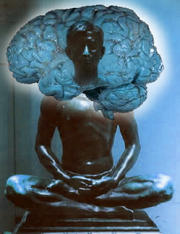 I have recently become interested in the Dalai Lama's thoughts on the possible interaction between Buddhist meditation and modern neurobiology. The Dalai Lama appears to believe that the future of religion will be greatly influenced by a collaboration between these two fields.
I have recently become interested in the Dalai Lama's thoughts on the possible interaction between Buddhist meditation and modern neurobiology. The Dalai Lama appears to believe that the future of religion will be greatly influenced by a collaboration between these two fields.At first it sounded a little new agey and spacey, but he makes some points which might be worth serious consideration. As I had previously read of, the philosopher David Chalmers has identified the "hard question" of consciousness which relates to trying to explain the "qualia" of consciousness - in other words, what it feels like to be conscious as opposed to the "easy question" which regards mere neurological function correlated to behavior.
The Dalai Lama suggests that our experience of consciousness is inherently subjective (from a point-of-view), so we may need to employ inherently subjective methods to further understand its nature. Enter meditation. In brain scans, it appears that masters of meditation are capable of directing their brains into some pretty unusual patterns of activity, and this may tell us something about the nature of consciousness.
Then, reading from several different sources, some things seemed to relate to one another and I thought I should post my thoughts on this. In a paper called Buddhism and Cognitive Science, J. Niimi writes:
In another series of studies Newberg and d'Aquili propose that sensations of spiritual connection or transcendence of the self correlate with decreased blood flow to structures in the posterior superior parietal lobe, in a region they refer to as the "orientation association area," the module of the brain that compiles sensory data into a perception of the body's location in its environment.Now, it makes sense that low blood flow in an area of the brain known for handling perception of our body's location would result in out of body feelings. But then later, in an unrelated Wikipedia article on meditation, I come across this:
Predominantly, studies of meditation report positive effects. However, some studies report that meditation may have adverse effects in certain circumstances (Lukoff, Lu & Turner, 1998; Perez-De-Albeniz & Holmes, 2000). If practiced improperly or too intensely, meditation can lead to considerable psychological and physiological problems, such as the symptoms of Kundalini...Looking up Kundalini Syndrome in another article I find (bold mine):
Theorists within the schools of Humanistic psychology, Transpersonal psychology and Near-Death Studies describe a complex pattern of motor, sensory, affective and cognitive/hermeneutic symptoms called The Kundalini Syndrome. This psycho-somatic arousal and excitation is believed to occur in connection with prolonged and intensive spiritual or contemplative practice (such as meditation or yoga)... Cognitive and affective symptoms [among others] are said to include psychological upheaval, stress, depression, depersonalization or derealization, intense mood-swings, altered states of consciousness (trance-like experiences), hallucinations (inner visions or acoustical phenomena), but also moments of bliss and deep peace.
Could it be that intense, long term practices of meditation allow the most skilled of us to direct brain activity to such an extent that blood flow is reduced to certain areas of the brain for long periods? If so, it seems that lack of blood (oxygen) to brain cells tends to kill them. It doesn't seem unreasonable to think that damage to areas like the parietal lobe might result from this and yield the symptoms we see in Kundalini Syndrome.
This is, of course, very rare and not meant as any sort of warning against meditation. I present it merely because it's such a fascinating thought and because it came to me after seeing these bits in different sources and putting them together. Whether I've put together these facts in a way that more knowledgeable people would think is sensible is another matter, of which I'm not certain.

interesting!
ReplyDeleteThanks for reading Newsandseduction!
ReplyDelete